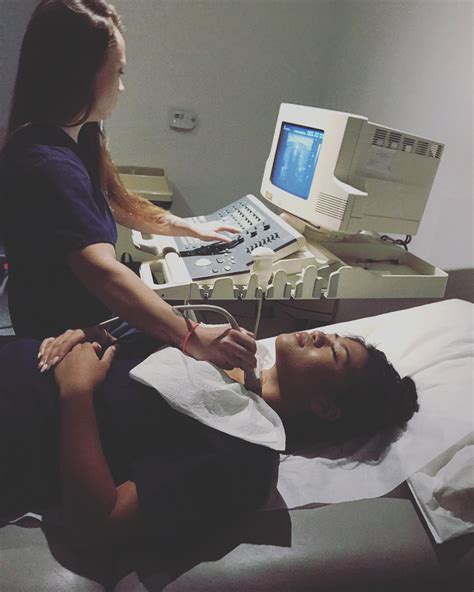As a vital part of the medical imaging team, ultrasound technologists play a crucial role in helping doctors diagnose and treat various health conditions. To become a certified ultrasound technologist, one must complete a series of ultrasound tech classes that cover both theoretical and practical aspects of the field. In this article, we'll delve into the required courses for certification and provide an overview of the education and training process.
Importance of Ultrasound Tech Classes
Ultrasound technology has revolutionized the medical field, enabling healthcare professionals to visualize internal organs and tissues in real-time. As a result, ultrasound technologists are in high demand, and their services are essential in various medical specialties, including obstetrics, cardiology, and vascular medicine. To prepare students for this critical role, ultrasound tech classes focus on developing the necessary skills and knowledge to produce high-quality images and provide excellent patient care.
Overview of Ultrasound Tech Classes
The typical ultrasound tech program consists of two years of post-secondary education, culminating in an associate's degree or a postsecondary certificate. These programs are designed to provide students with a comprehensive education in ultrasound technology, covering both the theoretical and practical aspects of the field. Some of the required courses for certification include:
Foundational Courses
These courses lay the foundation for further study in ultrasound technology, covering topics such as:
- Anatomy and Physiology: This course provides an in-depth understanding of the human body's structure and function, including the musculoskeletal, nervous, and circulatory systems.
- Patient Assessment and Communication: Students learn how to assess patients' medical histories, communicate effectively, and provide emotional support.
- Medical Ethics and Law: This course covers the principles of medical ethics, patient confidentiality, and the legal aspects of healthcare.
Ultrasound Physics and Instrumentation
These courses focus on the principles of ultrasound physics and instrumentation, including:
- Ultrasound Physics: Students learn about the principles of sound waves, frequency, and wavelength, as well as the interactions between sound waves and tissue.
- Ultrasound Instrumentation: This course covers the components and operation of ultrasound equipment, including transducers, scanners, and image processing systems.
Clinical Specialty Courses
These courses provide in-depth training in various clinical specialties, including:
- Obstetric and Gynecologic Ultrasound: Students learn how to perform ultrasound examinations of the female reproductive system, including fetal development and maternal health.
- Abdominal and Small Parts Ultrasound: This course covers the ultrasound examination of abdominal organs, including the liver, gallbladder, and pancreas.
- Cardiovascular Ultrasound: Students learn how to perform ultrasound examinations of the heart and blood vessels, including echocardiography and vascular sonography.
Clinical Practicum
This course provides hands-on training in a clinical setting, where students work directly with patients and healthcare professionals to develop their scanning skills and patient care techniques.
Professional Development and Registry Review
These courses prepare students for the certification exam and professional practice, covering topics such as:
- Professional Development: Students learn about the importance of continuing education, professional organizations, and licensure.
- Registry Review: This course reviews the material covered on the certification exam, providing students with a comprehensive review of ultrasound technology.

Certification and Career Opportunities
Upon completing the required ultrasound tech classes, graduates are eligible to take the certification exam administered by the American Registry for Diagnostic Medical Sonography (ARDMS) or the Cardiovascular Credentialing International (CCI). Certification demonstrates a level of competence and expertise in ultrasound technology, enhancing career opportunities and professional growth.
In addition to certification, ultrasound technologists can pursue various career paths, including:
- Hospital and Clinical Settings: Ultrasound technologists work in hospitals, clinics, and private practices, performing diagnostic imaging procedures and providing patient care.
- Research and Education: With advanced degrees, ultrasound technologists can pursue careers in research, education, and academia, contributing to the development of new technologies and training the next generation of sonographers.
- Industry and Sales: Some ultrasound technologists work in the industry, representing manufacturers and distributors of ultrasound equipment, or in sales, providing technical support and training to healthcare professionals.
Gallery of Ultrasound Tech Classes





Frequently Asked Questions
What is the typical duration of an ultrasound tech program?
+The typical duration of an ultrasound tech program is two years, culminating in an associate's degree or a postsecondary certificate.
What are the requirements for certification in ultrasound technology?
+To become certified, ultrasound technologists must complete a recognized education program and pass the certification exam administered by the American Registry for Diagnostic Medical Sonography (ARDMS) or the Cardiovascular Credentialing International (CCI).
What are the career opportunities for ultrasound technologists?
+Ultrasound technologists can pursue various career paths, including hospital and clinical settings, research and education, and industry and sales.
In conclusion, ultrasound tech classes provide students with a comprehensive education in ultrasound technology, covering both theoretical and practical aspects of the field. By completing the required courses and obtaining certification, ultrasound technologists can pursue rewarding careers in healthcare, contributing to the diagnosis and treatment of various medical conditions.
